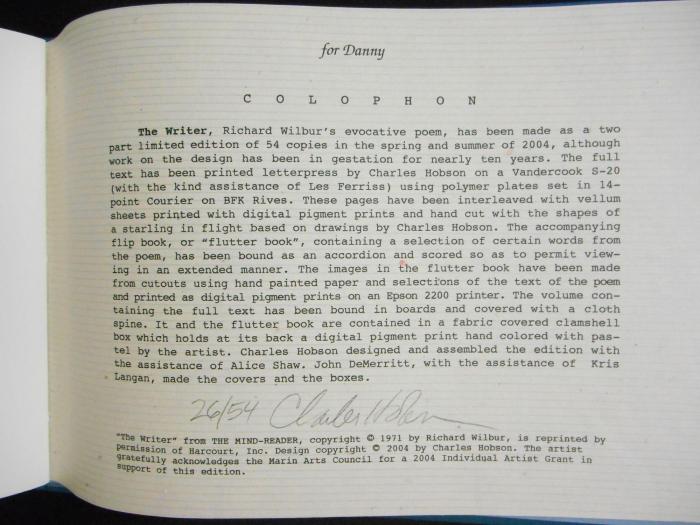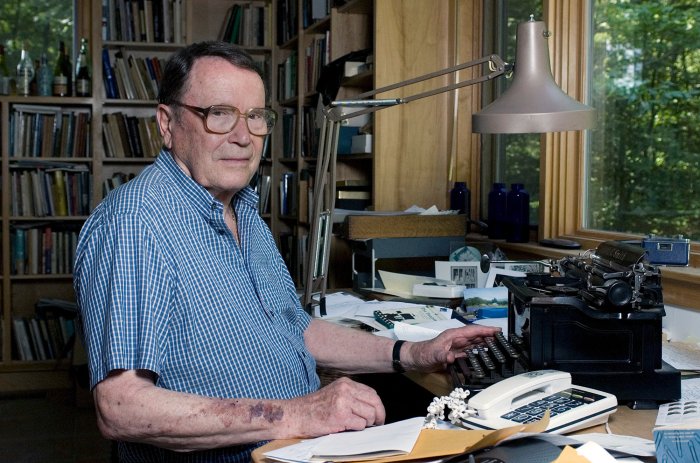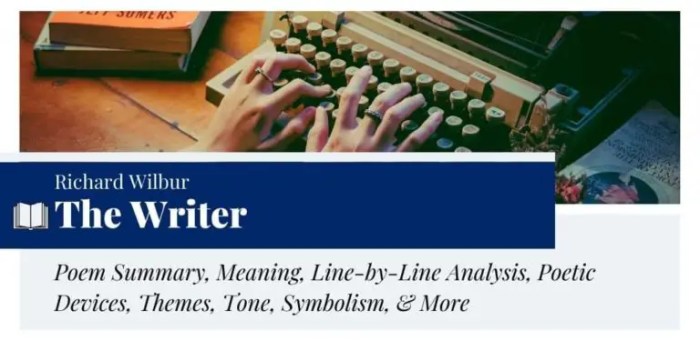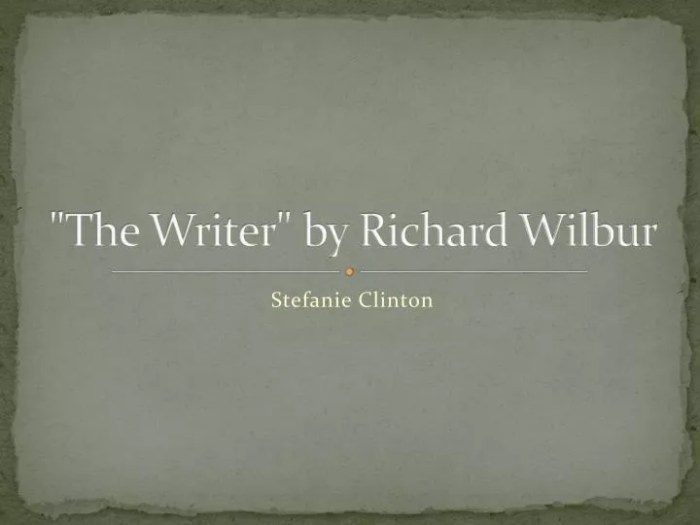The writer by richard wilbur – In Richard Wilbur’s “The Writer,” we embark on a poetic journey into the enigmatic realm of literary creation. Through vivid imagery and masterful language, Wilbur illuminates the intricate workings of the writer’s mind, exploring the profound influence of nature, imagination, and memory on the creative process.
This poem delves into the writer’s struggles, triumphs, and the profound impact of their craft on the human experience.
Biographical Sketch of Richard Wilbur

Richard Wilbur was born in New York City on March 1, 1921. He studied at Amherst College and Harvard University, where he was influenced by the works of T.S. Eliot, Robert Frost, and W.H. Auden.
During World War II, Wilbur served in the U.S. Army Air Forces as a cryptographer. His experiences during the war had a profound impact on his writing, which often explored themes of loss, grief, and the search for meaning in a chaotic world.
Teaching Career
After the war, Wilbur taught at several universities, including Harvard, Wesleyan, and Boston University. His teaching career had a significant influence on his literary style, as he developed a deep understanding of the craft of poetry and the importance of clear and precise language.
Major Themes in “The Writer”

Richard Wilbur’s poem “The Writer” delves into the intricate nature of the writing process, exploring the interconnectedness between the writer’s inner world and the external environment.
Richard Wilbur’s The Writer offers profound insights into the craft of writing. The book’s exploration of language and form resonated with me, reminding me of Ken Macrorie’s essay The Poison Fish . Macrorie’s work emphasizes the importance of authentic expression, challenging traditional writing conventions.
Wilbur’s insights on the transformative power of words complement Macrorie’s ideas, providing a comprehensive perspective on the art of writing.
Motif of Nature
Nature serves as a potent muse for the writer, offering inspiration and solace. The natural world provides a rich tapestry of imagery and metaphor, allowing the writer to draw connections between the external and internal landscapes. Through observation and reflection, the writer finds solace and rejuvenation in the rhythms and patterns of nature, which in turn fuel their creativity.
Imagination and Memory
The writer’s imagination is a boundless realm where memories, experiences, and dreams intertwine. The poem highlights the transformative power of imagination, as the writer weaves fragments of their past into the fabric of their work. Memory plays a crucial role in shaping the writer’s perspective and providing the raw material for their creations.
By delving into the depths of their own experiences, the writer finds the inspiration and authenticity that fuel their writing.
Poetic Devices and Techniques

Richard Wilbur’s “The Writer” is a testament to the power of language and the craft of poetry. Wilbur employs a range of literary devices and techniques to create a poem that is both musically pleasing and thought-provoking.
Metaphors and Similes
Wilbur uses metaphors and similes to create vivid and memorable images. For example, he compares the writer’s pen to a “wand” and the words it produces to “music.” These comparisons suggest that the writer has the power to create something magical and transformative.
Imagery
Wilbur’s use of imagery is also noteworthy. He paints a vivid picture of the writer’s workspace, with its “blank page” and “inkwell.” This imagery helps to create a sense of intimacy and immediacy, as if the reader is right there with the writer as they work.
Rhyme, Rhythm, and Meter
The poem’s musicality is enhanced by Wilbur’s use of rhyme, rhythm, and meter. The poem is written in iambic pentameter, which gives it a steady, flowing rhythm. The rhyme scheme is also carefully crafted, with alternating masculine and feminine rhymes.
This creates a sense of balance and harmony, which adds to the poem’s overall impact.
Language
Wilbur’s use of language is precise and evocative. He chooses words that are both beautiful and meaningful, and he arranges them in a way that creates a sense of tension and release. This tension is evident in the poem’s opening lines, which describe the writer’s struggle to find the right words:
“The page is blank, the inkwell’s dry,And I am dumb. The words won’t come.”
However, the poem ends on a note of hope, as the writer finally finds the words they need:
“And now the words begin to flow,And I am writing, writing, writing.”
Wilbur’s use of language in these lines is both powerful and moving. He captures the frustration and joy of the writing process, and he reminds us of the transformative power of words.
Critical Reception and Interpretation: The Writer By Richard Wilbur

Upon its publication, “The Writer” garnered critical acclaim for its insightful exploration of the creative process and its introspective nature. Critics lauded Wilbur’s skillful use of language and imagery, praising the poem’s evocative power and philosophical depth.
Diverse Interpretations, The writer by richard wilbur
The poem has been subject to diverse interpretations, with scholars offering varying perspectives on its themes and significance. Some critics view it as a meditation on the solitary nature of the writer’s craft, while others interpret it as an exploration of the writer’s responsibility to society.
Another interpretation suggests that the poem examines the tension between the writer’s desire for artistic freedom and the constraints imposed by external forces, such as societal expectations or the need for commercial success.
Place in Wilbur’s Canon and American Poetry
“The Writer” holds a significant place within Wilbur’s literary canon, showcasing his mastery of poetic form and his preoccupation with the themes of creativity, self-reflection, and the human condition.
The poem has also been recognized as a valuable contribution to American poetry, contributing to the tradition of introspective and philosophical verse. Its enduring appeal lies in its ability to resonate with readers on a deeply personal level, offering insights into the complexities of the creative process and the human experience.
General Inquiries
What is the central theme of “The Writer”?
The poem explores the creative process, particularly the role of nature, imagination, and memory in shaping the writer’s craft.
How does Wilbur use language in the poem?
Wilbur employs a rich and evocative vocabulary, using metaphors, similes, and imagery to create a vivid and multi-layered poetic landscape.
What is the significance of the poem’s critical reception?
“The Writer” has been widely praised for its insightful exploration of the creative process and its enduring relevance to the human experience.